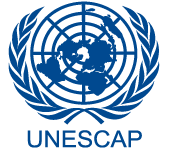United Nations Economic and Social Commission for Asia and the Pacific (UNESCAP)

Susan F. Stone
Director, Trade, Investment and Innovation Division,
UNESCAP
United Nations Building,
Rajadamnern Nok Avenue,
Bangkok, 10200, Thailand
Tel: +66 2 288 1902
E-mail: stone [at] un.org
Web: www.unescap.org
Adnan Aliani
Chief
Strategy and Programme Management Division,
UNESCAP
United Nations Building,
Rajadamnern Nok Avenue,
Bangkok, 10200, Thailand
Tel: +66 2 288 1602
E-mail: escap-spmd [at] un.org (escap-spmd[at]un[dot]org)
Web: www.unescap.org
Rajadamnern Nok Avenue,
Bangkok, 10200, Thailand
The United Nations Economic and Social Commission for Asia and the Pacific (ESCAP) is the regional development arm of the United Nations for the Asia-Pacific region. With a membership of 62 Governments, 58 of which are in the region, and a geographical scope that stretches from Turkey in the west, to the Pacific island nation of Kiribati in the east, and from the Russian Federation in the north to New Zealand in the south, ESCAP is the largest regional commission in terms of membership. It is also the largest United Nations body serving the Asia-Pacific region, with over 600 staff.
Established in 1947 with its headquarters in Bangkok, Thailand, ESCAP seeks to overcome some of the region’s greatest challenges. It carries out work in the following areas:
• Macroeconomic Policy, Poverty Reduction and Financing for Development;
• Trade, Investment and Innovation;
• Transport;
• Environment and Development;
• Information and Communications Technology and Disaster Risk Reduction;
• Social Development;
• Statistics;
• Subregional activities for development; and
• Energy.
ESCAP focuses on issues that are most effectively addressed through regional cooperation, including:
• Issues that all or a group of countries in the region face and for which it is necessary to learn from each other;
• Issues that benefit from regional or multi-country involvement;
• Issues that are trans-boundary in nature, or that would benefit from collaborative inter-country approaches;
• Issues that are of a sensitive or emerging nature, and require further advocacy and negotiation.
ESCAP’s mandate is to promote economic and social development in the Asian and Pacific region by fostering cooperation between its members and associate members. The organization’s objective in the area of trade and investment, as defined in its Strategic Framework for the biennium 2016-2017 approved by the General Assembly, is to support the contribution of trade, investment, enterprise development, innovation and technology transfer to inclusive and sustainable development in the Asia-Pacific region.
Selected TCB programmes and initiatives in this guide
Successful TCB activities include:
(i) Asia-Pacific Research and Training Network on Trade (ARTNeT), an open regional network composed of leading trade research institutions across the region, that aims to equip the region with a mechanism for enhancing the capacity of research institutions; (ii) WTO/ESCAP technical assistance programmes for government officials to develop increased knowledge and awareness of issues related to accession to WTO, implementation of WTO agreements and commitments and/or issues related to negotiations within the framework of the Doha Development Agenda; and (iii) launching of the United Nations Network of Experts for Paperless Trade and Transport in Asia and the Pacific (UNNExT) supporting implementation single window and related measures for trade facilitation.
In carrying out work related to trade capacity building, ESCAP has developed partnerships with the following organizations:
• ADB;
• ITC;
• OECD;
• The European Community;
• The Secretariat of the Integration Committee of the Eurasian Economic Community;
• UNCTAD;
• UNDP;
• UNECE;
• UNECA;
• UNECLAC;
• UNIDO; and
• WTO.
In addition, ESCAP’s joint initiative with the International Development Research Centre (IDRC) and a number of national research institutions led to the launch of the Asia-Pacific Research and Training Network on Trade (ARTNeT) in 2004.
For more information: www.unescap.org/our-work/trade-investment-innovation
